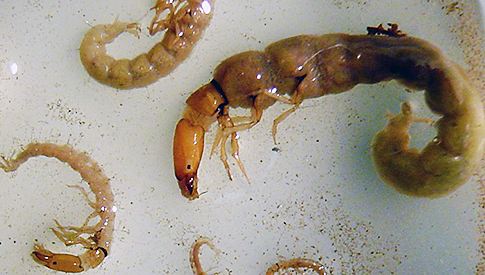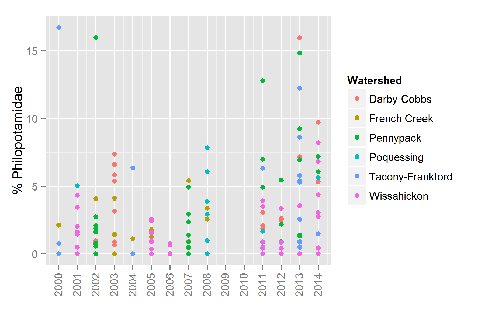

The Philopotamid caddisfly larvae. Credit: Philadelphia Water
Uh, not those Phils. With 62 losses already in the season and the All-Star break just behind us, we're talking about the comeback of a different kind of “Phils,” the aquatic insects of the family Philopotamidae.
The larvae of these tiny invertebrates, also known as fingernet spinning caddisflies, live under rocks in well-oxygenated areas of streams.
Philadelphia Water scientists have been surveying insects and other forms of aquatic life in Philadelphia area streams for more than 15 years now to assess water quality and habitat conditions. You’d be surprised what you can learn from bugs—they’re a big part of what scientists call “bioindicators.”
The last few years, we've noticed a bit of an uptick in the number of Phils in our samples—a good thing because these little guys are somewhat more sensitive to pollution than many other aquatic insects we usually find in urban streams.
Here's a look at what we've found since 2000:

Above: Percent Philopotamide caddisflies in Philadelphia Water stream survey samples 2000-2014. Note: No samples were taken in 2009-10. Each dot represents a specific sample location.
It's too early to speculate on what might be responsible for the increase. Maybe intense storms in 2004 and 2005 depressed the numbers of Phils and we're just seeing a return to normal conditions. Maybe we're seeing more Phils because we've begun to spread our sampling stations around the various city streams a little more—nobody knows.
But it is, nevertheless, a good sign to see increased numbers of slightly more pollution-sensitive insects. We hope the trend keeps up as more stringent stormwater regulations, introduced July 1, are implemented and Green City, Clean Waters continues to grow. Those efforts will improve dissolved oxygen levels (good news for the Phils) in our waterways by reducing the amount of stormwater pollution entering our rivers and streams.
Read more about what you can do to give these Phils a fightin' chance on the Rain Check page.
Guest blogger Jason Cruz is an aquatic biologist at Philadelphia Water.